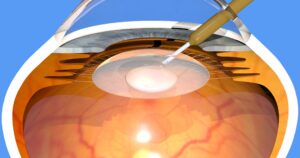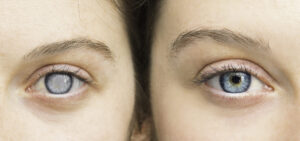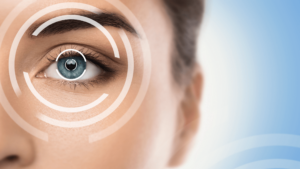Macular degeneration is a common eye condition that can affect individuals as they age. It is a progressive disease that primarily impacts the central part of the retina, also known as the macula. This part of the eye is responsible for helping us see fine details, making it crucial for activities such as reading and driving. In this article, we will explore what macular degeneration is, its symptoms, causes, and available treatments.
Understanding Macular Degeneration
What is Macular Degeneration?
Macular degeneration is a condition that affects the macula, a small but critical part of the retina that is responsible for central vision. The macula is responsible for processing the sharp, detailed images that allow us to read, recognize faces, and see fine details. When the cells in the macula become damaged, it can lead to changes in central vision and make it difficult to perform daily activities.
Macular degeneration is a progressive disease, meaning that it gets worse over time. While it typically occurs later in life, it can also affect younger individuals in rare cases. The damage caused by macular degeneration can result in a loss of central vision, making it difficult to see objects directly in front of you.
Types of Macular Degeneration
There are two main types of macular degeneration: dry and wet. Dry macular degeneration is the more common type and is characterized by the slow breakdown of the macula. This breakdown is caused by the accumulation of small, yellow deposits called drusen, which can eventually lead to the death of the macular cells. While dry macular degeneration typically progresses slowly, it can still lead to significant vision loss over time.

Wet macular degeneration, on the other hand, is rarer and occurs when new blood vessels grow abnormally beneath the retina. These blood vessels can leak fluid and blood, causing damage to the macular cells and leading to rapid vision loss. Without prompt treatment, wet macular degeneration can cause permanent damage to the macula and result in severe vision loss. Click here to read more about What are the possible causes of cataracts?
Prevalence and Risk Factors
Macular degeneration is a prevalent condition, particularly in individuals over the age of 60. In fact, it is the leading cause of vision loss in older adults in the United States. However, genetics, smoking, and poor diet can also increase the risk of developing the disease. Studies have shown that individuals with a family history of macular degeneration are at a higher risk of developing the condition themselves. Smoking can also increase the risk of macular degeneration, as can a diet that is high in saturated fats and low in fruits and vegetables.
Furthermore, individuals with high blood pressure, high cholesterol levels, and obesity may be at greater risk of developing macular degeneration. These conditions can affect the blood vessels in the eye, leading to damage to the macula and an increased risk of vision loss. Maintaining a healthy lifestyle, including regular exercise and a balanced diet, can help reduce the risk of developing macular degeneration.
If you are experiencing changes in your vision or are at risk of developing macular degeneration, it is important to speak with an eye cataract surgery doctor. Early detection and treatment can help slow the progression of the disease and preserve your vision.
Symptoms of Macular Degeneration
Macular degeneration is a condition that affects the retina, causing a gradual loss of central vision. It is a common condition among older adults and can significantly impact an individual’s quality of life. In this article, we will discuss the symptoms of macular degeneration and how it affects vision.
Early Signs and Symptoms
Macular degeneration can often go unnoticed as the early symptoms can be subtle. However, it is crucial to undergo regular eye exams, especially as you age, to detect any signs of macular degeneration early on.
One of the early signs of macular degeneration is the need for brighter light when reading. Individuals may find that they need to increase the brightness of their reading lamp or move closer to a light source to see clearly. Another early symptom is difficulty recognizing faces. Individuals may notice that they have trouble distinguishing between familiar faces, such as those of family members and friends. A gradual loss of the clarity of vision is also a common early symptom of macular degeneration.
Progression of Symptoms
As the condition progresses, symptoms may become more noticeable, and individuals may experience a distorted or wavy central vision. Straight lines may appear crooked or bent, and individuals may have difficulty reading, driving, or performing other everyday activities. They may also notice a blind spot in their central vision, making it difficult to see details such as words on a page.
It is essential to seek medical attention if you experience any of these symptoms. Early detection and treatment can help slow the progression of macular degeneration and preserve your vision.
How Macular Degeneration Affects Vision
The damage caused by macular degeneration can significantly affect an individual’s quality of life. As central vision is impacted, everyday activities such as reading, driving, and recognizing faces can become incredibly challenging. Individuals with advanced macular degeneration may experience severe visual impairment, leading to blindness in severe cases.
Macular degeneration can also impact an individual’s mental health and well-being. The loss of vision can lead to feelings of isolation, depression, and anxiety. It is essential to seek support from loved ones and healthcare professionals to manage the emotional impact of macular degeneration.
In conclusion, macular degeneration is a common condition that can significantly impact an individual’s quality of life. It is crucial to undergo regular eye exams to detect any signs of macular degeneration early on. If you experience any symptoms, seek medical attention promptly to preserve your vision and manage the emotional impact of the condition.
Causes of Macular Degeneration
Macular degeneration is a condition that affects the central part of the retina, known as the macula. The macula is responsible for providing sharp, central vision, which is necessary for reading, driving, and other daily activities. The condition is progressive and can lead to significant vision loss if left untreated. In this article, we will explore the various causes of macular degeneration.
Genetic Factors
Research has shown that genetics play a role in the development of macular degeneration. Individuals with a family history of the disease are at a greater risk of developing the condition. Specific genes that have been linked to macular degeneration include the complement factor H (CFH) and age-related maculopathy susceptibility 2 (ARMS2) genes.
It is important to note that having a genetic predisposition to macular degeneration does not necessarily mean that an individual will develop the condition. Other factors, such as environmental and lifestyle factors, can also contribute to the development of the disease.
Environmental Factors
Smoking is a significant environmental risk factor for macular degeneration, with smokers being four times more likely to develop the condition than nonsmokers. Prolonged exposure to sunlight and blue light from electronic devices may also contribute to the development of macular degeneration.
Protecting your eyes from UV radiation by wearing sunglasses and limiting your exposure to blue light by reducing screen time can help reduce your risk of developing macular degeneration.
Lifestyle Factors
Diet plays a role in the development of macular degeneration, with a Western diet high in saturated fats and processed foods being an environmental risk factor for the disease. A diet rich in antioxidants, omega-3 fatty acids, and green leafy vegetables may help protect against macular degeneration.
In addition to diet, regular exercise and maintaining a healthy weight can also help reduce your risk of developing macular degeneration.
Age-Related Factors
As mentioned before, macular degeneration primarily affects older individuals. The condition is more common in individuals over the age of 60 and becomes increasingly prevalent as people age. This is due to the natural aging process of the body, which can lead to changes in the retina and the development of macular degeneration.
While age is a significant risk factor for macular degeneration, taking steps to protect your vision and reduce your risk factors can help prevent or delay the onset of the disease.
Diagnosing Macular Degeneration
Macular degeneration is a progressive eye disease that affects the macula, the part of the retina responsible for central vision. It is a leading cause of vision loss in people over the age of 60. Early detection and treatment are crucial in preventing severe vision loss and blindness.
Comprehensive Eye Exams
Regular eye exams are crucial for the early detection and monitoring of macular degeneration. During a comprehensive eye exam, your eye doctor will evaluate your overall eye health and check for signs of macular degeneration. Eye exams may include tests such as a visual acuity test, a dilated eye exam, and an Amsler grid test to detect any changes in central vision.
A visual acuity test measures how well you can see at various distances. A dilated eye exam involves the use of eye drops to dilate your pupils, allowing your eye doctor to examine the back of your eye, including the retina and optic nerve. An Amsler grid test involves looking at a grid of straight lines to check for any distortion or waviness, which may indicate macular degeneration.
Diagnostic Tests
If macular degeneration is suspected, diagnostic tests such as optical coherence tomography (OCT) or fluorescein angiography may be performed to examine the retina’s blood vessels and detect any abnormalities or damage. OCT uses light waves to create a detailed image of the retina, while fluorescein angiography involves injecting a dye into your arm and taking pictures as the dye passes through the blood vessels in your eye.
Stages of Macular Degeneration
There are three stages of macular degeneration: early, intermediate, and advanced. Early macular degeneration may show no symptoms, while intermediate macular degeneration may involve slight vision loss. In advanced macular degeneration, severe vision loss and blindness may occur.
It is important to note that macular degeneration affects each person differently, and not everyone will progress through all three stages. Some people may experience rapid progression, while others may have a slow progression or no progression at all.
If you have been diagnosed with macular degeneration or are at risk for developing the condition, it is important to work closely with your eye doctor to monitor your vision and receive appropriate treatment. Lifestyle changes, such as quitting smoking and eating a healthy diet, may also help slow the progression of macular degeneration.
Treatments for Macular Degeneration
Currently, there is no cure for macular degeneration. However, treatments such as medications, laser surgery, and implantable devices may help slow the progression of the disease and alleviate symptoms. A healthy lifestyle may also help reduce the risk of developing macular degeneration and slow its progression.
Conclusion
Macular degeneration is a prevalent eye condition that can significantly impact an individual’s quality of life. Understanding the symptoms and risk factors of macular degeneration is crucial for its early detection and treatment. As there is currently no cure for the condition, preventative measures such as maintaining a healthy lifestyle and attending regular eye exams are essential in reducing the risk of developing macular degeneration and slowing its progression.




